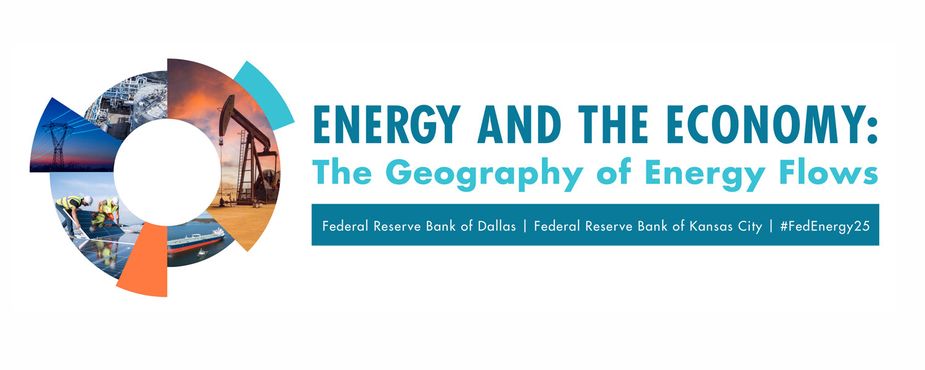When energy flows shift, their effects ripple far beyond the pipelines and power plants. In the 10th District, spanning Colorado, Kansas, western Missouri, Nebraska, northern New Mexico, Oklahoma and Wyoming, energy is deeply woven into local economies, infrastructure and public policy. Recognizing this, the Kansas City Fed partners with the External LinkDallas Fed to host the annual “Energy and the Economy” conference – a gathering designed to give voice, data and urgency to the intersection of energy and economic stability.
This year’s conference, “Energy and the Economy: The Geography of Energy Flows,” takes place on Friday, Nov. 14, in Denver, Colorado (with virtual attendance options). The agenda will focus on global energy outlooks, trade flows and domestic infrastructure gaps that must be bridged to support shifting demand. Click here to learn more about the conference and register to attend.

Why the Kansas City Fed Invests in this Dialogue
For the Kansas City Fed, the annual energy conference is more than an event – it is part of a long-term commitment to understanding how energy dynamics inform regional economic trajectories. The 10th District contains states and regions with significant energy production, from wind and solar in Kansas and Colorado to oil and gas activity in Oklahoma and New Mexico. As of the first half of 2025, 10th District states produced approximately 13% of U.S. oil and gas.
By organizing experts, industry leaders, and policy thinkers, the Fed gains direct exposure to the challenges and innovations shaping energy markets. That allows economists and researchers to calibrate models and projections with grounded insight, rather than relying solely on national totals. It also helps the Fed monitor how energy investment, regulatory friction, and infrastructure constraints feed into credit risk, capital allocation, and regional resilience.
“Our economy runs on energy, and a large share of our domestic energy production is based in the 10th and 11th Federal Reserve Districts,” said Assistant Vice President and Oklahoma Branch Executive, Cortney Cowley. “The stability of our regional and national economies depends not just on where energy flows, but on how well we understand those flows, which will be the focus of the 2025 Energy Conference.”
The Kansas City Fed also positions itself as a convener and bridge-builder. Bringing together stakeholders from local governments, utilities, academia and private firms reinforces the Fed’s regional relevance – signaling to communities and leaders that energy transitions matter not only for Wall Street but for Main Streets too.
Energy’s Role in the 10th District’s Economic Fabric
In much of the 10th District, energy is not a standalone industry; it’s a force multiplier. Changes in commodity prices or production can directly influence tax revenues, job creation, and business investment in agriculture, manufacturing, or services. As demand for electricity increases and the energy mix shifts, transmission, storage, permitting and grid reliability become choke points. Regions that once benefitted from energy abundance now must contend with balancing legacy infrastructure and new demands. “The energy sector has changed significantly in recent decades, as has the sector’s connection to the regional, national, and global economy,” said Vice President and Denver Branch Executive Nicholas Sly. “This conference is one of the most important ways the Fed is able to track those changes. Moreover, the large audience of the conference helps to build broad awareness to the changes we see in the energy sector.”
This delicate balance makes it essential for the Fed to follow these trends closely. The KC Fed administers an Energy Survey within its district, gathering data about capital expenditures, constraints, production, and expectations. Over at the Dallas Fed, the Dallas Fed Energy Survey collects similar data from roughly 200 oil and gas firms across the 11th District, tracking business outlook, cost pressures and sentiment.
Are you interested in getting energy-related insights and research from the Kansas City Fed directly to your inbox? You can subscribe to energy e-alerts here.
Join the Conversation: Register Today
This year’s conference aims to sharpen focus on how energy trade, infrastructure, and global market shifts influence regional opportunity. Whether you attend in person in Denver or join virtually, the event offers a window into insight and influence. Registration for in-person attendance is $149; virtual participation is free.
Register now through Tuesday, Nov. 7, and be part of the conversation that links energy and policy.
Event Details
When: Friday, Nov. 14, from 7 a.m. to 5 p.m. MST
Where: Denver Branch
The views expressed are those of the authors and do not necessarily reflect the positions of the Federal Reserve Bank of Kansas City or the Federal Reserve System.
